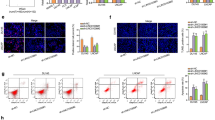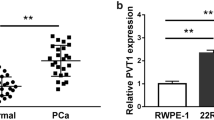Abstract
The metastasis is a major reason for the poor prognosis of the patients with prostate cancer (PC). Currently, androgen deprivation therapy (ADT) is the basic method for the treatment of PC regardless of surgery or drug treatments. However, ADT therapy is generally not recommended for patients with advanced/metastatic PC. Herein, we report for the first time a long non-coding RNA (lncRNA)-PCMF1 which promotes the progression of Epithelial-Mesenchymal Transition (EMT) in PC cells. Our data demonstrated that PCMF1 in metastatic PC tissues increased significantly compared to non-metastatic specimens. Mechanism research showed that PCMF1 could competitively bind to hsa-miR-137 instead of the 3' -Untranslated Region (UTR) of Twist Family BHLH Transcription Factor 1 (Twist1) by acting as an endogenous miRNA sponge. Furthermore, we found that silence of PCMF1 effectively blocked the EMT in PC cells by indirectly suppressing Twist1 protein mediated by hsa-miR-137 at post-transcriptional level. In summary, our research shows that PCMF1 promotes the EMT of PC cells by causing the functional inactivation of hsa-miR-137 on Twist1 protein, which is an independent risk factor of PC. PCMF1 knockdown combined with hsa-miR-137 expression is a promising PC-targeted therapy. Furthermore, PCMF1 is also expected to act as a useful marker for predicting malignant changes and assessing the prognosis of PC patients.





Similar content being viewed by others
Data Availability
All relevant data are within the paper.
References
Harshman, L. C., Chen, Y.-H., Liu, G., Carducci, M. A., Jarrard, D., Dreicer, R., Hahn, N., Garcia, J. A., Hussain, M., Shevrin, D., Eisenberger, M., Kohli, M., Plimack, E. R., Cooney, M., Vogelzang, N. J., Picus, J., Dipaola, R., & Sweeney, C. J. (2018). Seven-month prostate-specific antigen is prognostic in metastatic hormone-sensitive prostate cancer treated with androgen deprivation with or without docetaxel. Journal of clinical oncology: Official journal of the American Society of Clinical Oncology, 36, 376–382.
Burdett, S., Boevé, L. M., Ingleby, F. C., Fisher, D. J., Rydzewska, L. H., Vale, C. L., van Andel, G., Clarke, N. W., Hulshof, M. C., James, N. D., Parker, C. C., Parmar, M. K., Sweeney, C. J., Sydes, M. R., Tombal, B., Verhagen, P. C., & Tierney, J. F. (2019). Prostate radiotherapy for metastatic hormone-sensitive prostate cancer: A STOPCAP systematic review and meta-analysis. European urology, 76, 115–124.
Bray, F., Ferlay, J., Soerjomataram, I., Siegel, R. L., Torre, L. A., & Jemal, A. (2018). Global cancer statistics 2018: GLOBOCAN estimates of incidence and mortality worldwide for 36 cancers in 185 countries. CA: A Cancer Journal for Clinicians, 68, 394–424.
Sidaway, P. (2015). Prostate cancer: Treatment with ADT impairs cognitive performance. Nature reviews. Urology, 12, 361.
Barata, P., Swami, U., & Agarwal, N. (2020). The addition of apalutamide to ADT in the treatment of metastatic castration-sensitive prostate cancer: Safety and efficacy. Expert review of anticancer therapy, 20, 147–150.
Thomas, Betsan M., Smith, Christian, Evans, Jessica, Button, Michael R., Kumar, Satish, Palaniappan, Nachi, Staffurth, John, Tanguay, Jacob S., & Lester, Jason F. (2013). Time to prostate specific antigen (PSA) nadir may predict rapid relapse in men with metastatic castration-resistant prostate cancer (CRPC) receiving docetaxel chemotherapy. Medical oncology (Northwood, London, England), 30, 719.
Cyll, K., Ersvær, E., Vlatkovic, L., Pradhan, M., Kildal, W., Kjær, M. A., Kleppe, A., Hveem, T. S., Carlsen, B., Gill, S., Löffeler, S., Haug, E. S., Wæhre, H., Sooriakumaran, P., & Danielsen, H. E. (2017). Tumour heterogeneity poses a significant challenge to cancer biomarker research. British journal of cancer, 117, 367–375.
Khalil, A. M., Guttman, M., Huarte, M., Garber, M., Raj, A., Morales, D. R., Thomas, K., Presser, A., Bernstein, B. E., van Oudenaarden, A., Regev, A., Lander, E. S., & Rinn, J. L. (2009). Many human large intergenic noncoding RNAs associate with chromatin-modifying complexes and affect gene expression. Proceedings of the National Academy of Sciences of the United States of America, 106, 11667–11672.
Ferlay, J., Colombet, M., Soerjomataram, I., Mathers, C., & Parkin, D. M. (2019). Estimating the global cancer incidence and mortality in 2018. GLOBOCAN sources and methods, 144, 1941–1953.
Adolfsson, J. (2008). Watchful waiting and active surveillance: The current position. BJU international, 102, 10–14.
Dror Michaelson, M., Oudard, S., Yen-Chuan, Ou., Sengeløv, L., Saad, F., Houede, N., Ostler, P., Stenzl, A., Daugaard, G., Jones, R., Laestadius, F., Ullèn, A., Bahl, A., Castellano, D., Gschwend, J., Maurina, T., Maneval, E. C., Wang, S.-L., Lechuga, M. J., … Chen, I. (2014). Randomized, placebo-controlled, phase III trial of sunitinib plus prednisone versus prednisone alone in progressive, metastatic, castration-resistant prostate cancer. Journal of clinical oncology:Official journal of the American Society of Clinical Oncology, 32, 76–82.
Kelly, W. K., Halabi, S., Carducci, M., George, D., Mahoney, J. F., Stadler, W. M., Morris, M., Philip Kantoff, J., Monk, P., Kaplan, E., Vogelzang, N. J., & Small, E. J. (2012). Randomized, double-blind, placebo-controlled phase III trial comparing docetaxel and prednisone with or without bevacizumab in men with metastatic castration-resistant prostate cancer: CALGB 90401. Journal of clinical oncology : Official journal of the American Society of Clinical Oncology, 30, 1534–1540.
Bartel, D. P. (2009). MicroRNAs: Target recognition and regulatory functions. Cell, 136, 215–233.
Zhang, Y., Zhang, D., Lv, J., Wang, S., & Zhang, Q. (2018). miR-410-3p promotes prostate cancer progression via regulating PTEN/AKT/mTOR signaling pathway. Biochemical and biophysical research communications, 503, 2459–2465.
Wang, C., Tian, S., Zhang, D., Deng, J., Cai, H., Shi, C., & Yang, W. (2020). Increased expression of microRNA-93 correlates with progression and prognosis of prostate cancer. Medicine, 99, e18432.
Liu, J. B., Yan, Y. J., Shi, J., Wu, Y. B., Li, Y. F., Dai, L. F., & Ma, X. T. (2019). Upregulation of microRNA-191 can serve as an independent prognostic marker for poor survival in prostate cancer. Medicine, 98, e16193.
Chen, J. Y., Xu, L. F., Hu, H. L., Wen, Y. Q., Chen, D., & Liu, W. H. (2020). MiRNA-215-5p alleviates the metastasis of prostate cancer by targeting PGK1. European review for medical and pharmacological sciences, 24, 639–646.
Yang, B., Zhang, W., Sun, D., Wei, X., Ding, Y., Ma, Y., & Wang, Z. (2019). Downregulation of miR-139–5p promotes prostate cancer progression through regulation of SOX5. Biomedicine & pharmacotherapy=Biomedecine & pharmacotherapie, 109, 2128–2135.
Dong, B., Xu, G. C., Liu, S. T., Liu, T., & Geng, B. (2020). MiR-34a affects G2 arrest in prostate cancer PC3 cells via Wnt pathway and inhibits cell growth and migration. European review for medical and pharmacological sciences, 24, 8349–8358.
Jin, Min, Zhang, Tao, Liu, Can, Badeaux, Mark A., Liu, Bigang, Liu, Ruifang, Jeter, Collene, Chen, Xin, Vlassov, Alexander V., & Tang, Dean G. (2014). miRNA-128 suppresses prostate cancer by inhibiting BMI-1 to inhibit tumor-initiating cells. Cancer research, 74, 4183–4195.
Zhang, H., Liang, F., Yue, J., Liu, P., Wang, J., Wang, Z., Li, H., Cheng, D., Jie, Du., Zhang, K., & Peng, Du. (2020). MicroRNA-137 regulates hypoxia-mediated migration and epithelial-mesenchymal transition in prostate cancer by targeting LGR4 via the EGFR/ERK signaling pathway. International journal of oncology, 57, 540–549.
Wu, Q. Q., Zheng, B., & Weng, G. B. (2019). Downregulated NOX4 underlies a novel inhibitory role of microRNA-137 in prostate cancer. Journal of Cellular Biochemistry, 120, 10215–10227.
Guan, Y., Guan, X., An, H., Baihetiya, A., Wang, W., Shao, W., Yang, H., & Wang, Y. (2019). Epigenetic silencing of miR-137 induces resistance to bicalutamide by targeting TRIM24 in prostate cancer cells. American journal of translational research, 11, 3226–3237.
Xia, Q., Li, J., Yang, Z., Zhang, D., Tian, J., & Gu, B. (2020). Long non-coding RNA small nucleolar RNA host gene 7 expression level in prostate cancer tissues predicts the prognosis of patients with prostate cancer. Medicine, 99, e18993.
Bai, J., & Huang, G. (2020). Role of long non-coding RNA NEAT1 in the prognosis of prostate cancer patients. Medicine, 99, e20204.
Bourdoumis, A., Papatsoris, A. G., Chrisofos, M., Efstathiou, E., Skolarikos, A., & Deliveliotis, C. (2010). The novel prostate cancer antigen 3 (PCA3) biomarker. International braz j urol : Official journal of the Brazilian Society of Urology, 36, 665–668.
Wang, T., Qu, X., Jiang, J., Gao, P., Zhao, D., Lian, X., & Li, X. (2017). Diagnostic significance of urinary long non-coding PCA3 RNA in prostate cancer. Oncotarget., 8(35), 58577–58586.
Chunhua, L., Zhao, H., Zhao, H., Youyi, Lu., Jitao, Wu., Gao, Z., Li, G., Zhang, Y., & Wang, Ke. (2018). Clinical significance of peripheral blood pca3 gene expression in early diagnosis of prostate cancer. Translational oncology, 11, 628–632.
Neumann, E., Hennenlotter, J., Todenhöfer, T., Scharpf, M., Neumann, T., Schilling, D., Stenzl, A., & Bedke, J. (2017). The value and evaluability of the PCA3 urine assay in prostate carcinoma is independent of the tumor localization. Advances in therapy, 34, 966–974.
Acknowledgements
Not applicable.
Funding
Not applicable.
Author information
Authors and Affiliations
Corresponding author
Ethics declarations
Conflict of interest
The authors declare that they have no conflict of interests.
Additional information
Publisher's Note
Springer Nature remains neutral with regard to jurisdictional claims in published maps and institutional affiliations.
Rights and permissions
Springer Nature or its licensor (e.g. a society or other partner) holds exclusive rights to this article under a publishing agreement with the author(s) or other rightsholder(s); author self-archiving of the accepted manuscript version of this article is solely governed by the terms of such publishing agreement and applicable law.
About this article
Cite this article
Cui, H., Hou, C., Ma, Q. et al. Effect and Mechanism of lncRNA-PCMF1/hsa-miR-137/Twist1 Axis Involved in the EMT Regulation of Prostate Cancer Cells. Mol Biotechnol 65, 1991–2003 (2023). https://doi.org/10.1007/s12033-023-00709-y
Received:
Accepted:
Published:
Issue Date:
DOI: https://doi.org/10.1007/s12033-023-00709-y




